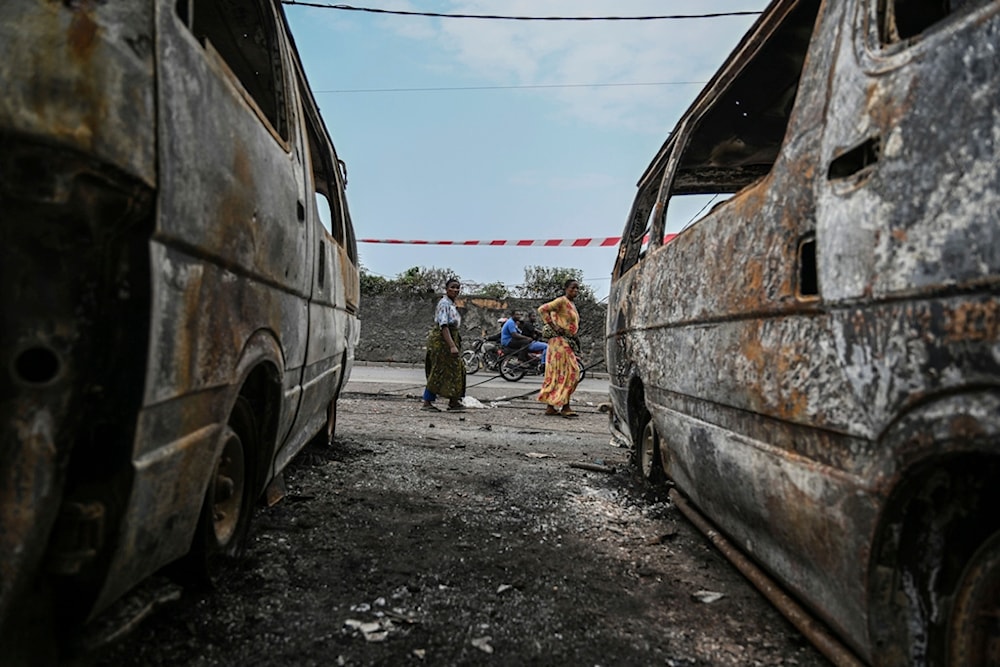EU faces pressure to suspend Rwanda minerals deal over DRC conflict
"The EU must not be complicit in the humanitarian tragedy unfolding in North Kivu," said a coalition of 15 MEPs in a letter urging the immediate suspension of the minerals agreement with Rwanda.
-

Residents walk by charred vehicles in Goma, Democratic Republic of the Congo, Friday, Jan. 31, 2025 (AP Photo/Moses Sawasawa)
The Guardian reported on Sunday that the EU is facing increasing calls to halt a controversial minerals agreement with Rwanda, as concerns grow over its likely role in exacerbating violence in the eastern Democratic Republic of the Congo (DRC). The deal, signed in February 2024, was meant to bolster Europe's access to essential raw materials for microchips and electric vehicle batteries, but critics argue it indirectly supports armed groups accused of fueling the conflict.
The calls for suspension have intensified following the capture of Goma, a key city in North Kivu, by the M23 rebels, a group widely believed to be backed by Rwanda. The UN and the US have reported that Rwanda exerts "de facto control" over the rebels and is using them to extract and export minerals from the DRC. Rwanda has denied these accusations, maintaining that its primary concern is combating militants linked to the 1994 genocide.
Belgium Leads Efforts to Revoke the Deal
Belgium, which previously colonized both DRC and Rwanda, has taken a prominent role in pushing for the EU to suspend the agreement. During a visit to Morocco, Belgian Foreign Minister Bernard Quintin stressed that diplomatic statements alone were insufficient, urging action:
"The international community must consider how to respond because declarations have not been enough. We have the levers and we have to decide how to use them."
Diplomatic insiders confirmed that Belgium has raised the issue at multiple levels, including during an EU foreign ministers' meeting last Monday.
Read more: 'A mourner on every corner': Goma death toll surpasses 770
The memorandum of understanding (MoU) between the EU and Rwanda, signed earlier this year, grants the bloc access to minerals such as tin, tungsten, gold, niobium, tantalum, and rare earth elements. In return, the EU has committed €900 million to develop Rwanda's infrastructure, improve healthcare, and enhance climate resilience. The funding is part of the Global Gateway Initiative, Europe's €300 billion response to China's Belt and Road strategy.
Growing Political Backlash in the EU
Within the European Parliament, lawmakers from multiple political groups are demanding an immediate suspension of the deal. Hilde Vautmans, a Belgian liberal MEP and head of the EU-Africa delegation, issued a stark warning:
"Given the overwhelming evidence that Rwanda is involved in supporting the M23 rebels in eastern Congo, it is imperative that the EU takes urgent action."
A coalition of 15 MEPs from Green, liberal, and left-wing factions also signed a letter condemning the agreement, arguing that it "unjustifiably grants international legitimacy to the Rwandan regime" and fails to account for its role in destabilizing eastern DRC.
The letter further warned: "The EU must not be complicit in the humanitarian tragedy unfolding in North Kivu."
Read more: Western embassies in Congo attacked, accused of complicity in violence

 3 Min Read
3 Min Read








